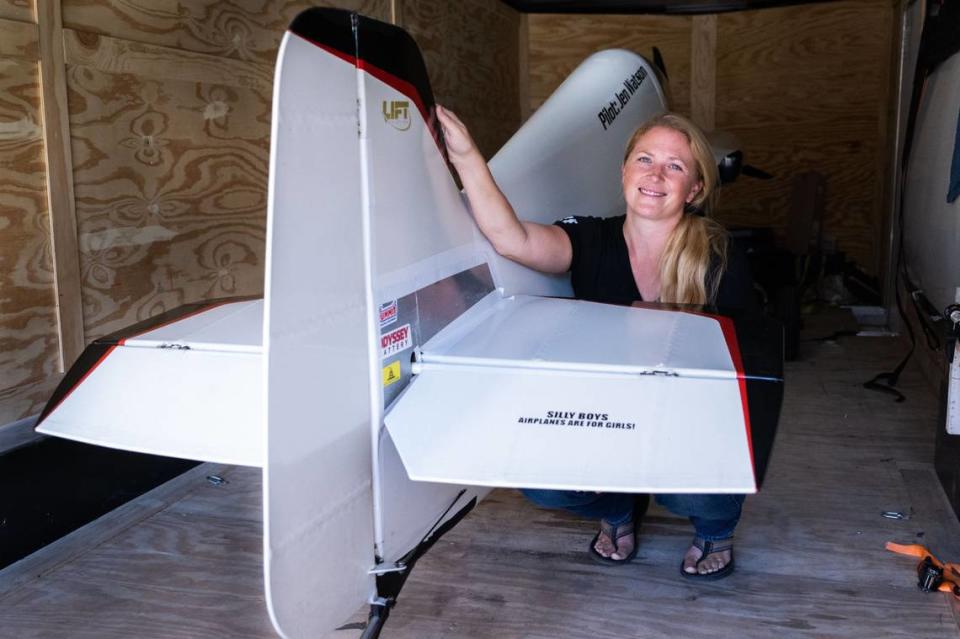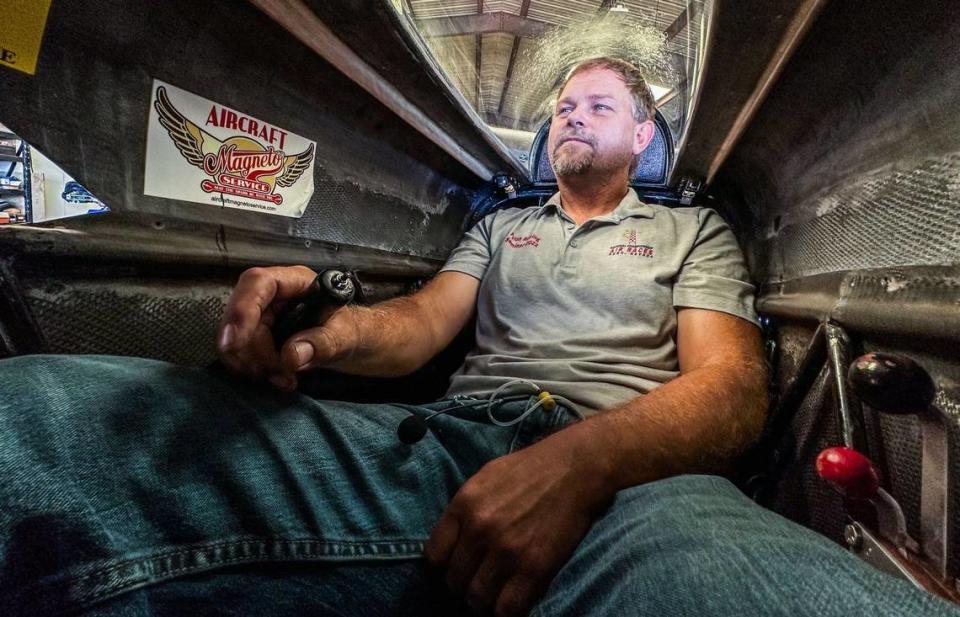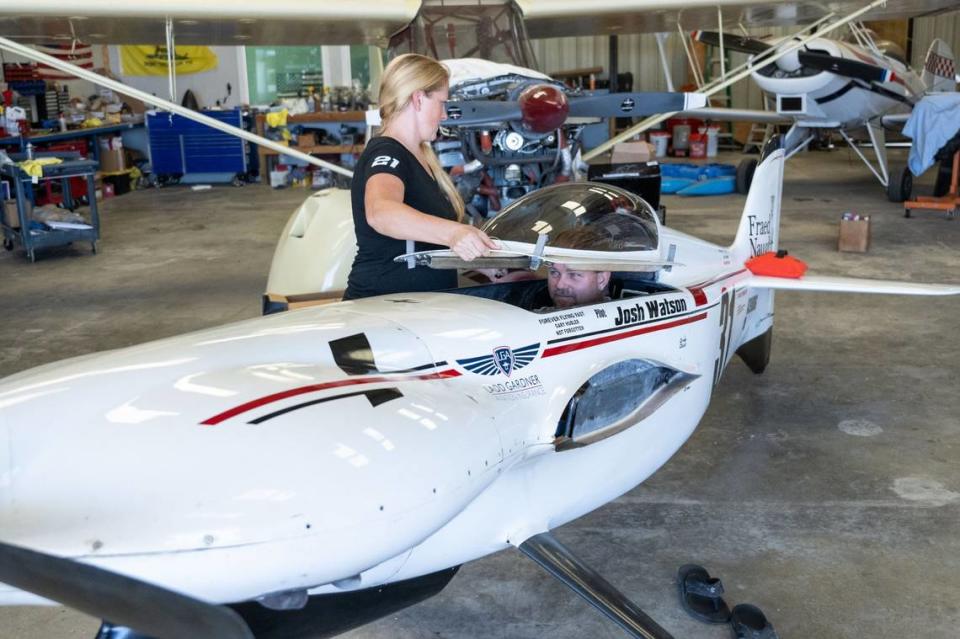Wilton couple competing in last Reno Air Races, a thrilling event with a deadly history
The National Championship Air Races and Air Show have been held in Reno since 1964 and are considered an institution in the sport. But this year’s iteration at the Reno Stead Airport will be the last, with the races looking for a new venue for 2024.
“It is bittersweet,” said Fred Telling, chairman and CEO of the Reno Air Racing Association. “There’s no question about it.”
Wednesday marks the the start of the five-day event with pilots and patrons from across the country converging on Reno to celebrate aviation and watch races featuring seven different classes of airplanes, from small jets to biplanes.
But the Reno Air Races also carry a history of deadly accidents, which is among the reasons the Reno-Tahoe Airport Authority decided against renewing the event after 2023. That decision was announced March 9, months after pilot Aaron Hogue died in a single-plane crash last September.
It marked the 20th fatal incident in the event’s 59-year history. Twenty-one pilots and 10 spectators have been killed, according to the Reno Gazette Journal. In 2011, 10 people died and 69 others were injured when a World War II-era plane crashed into a crowded tarmac.
“There are four big points and obviously the first one is public safety,” said Stacey Sunday, director of corporate communications for the Reno-Tahoe Airport Authority.
Sunday said the airport authority and race officials worked “very closely on these decisions,” and both sides agreed public safety was a top priority. Insurance costs have also become prohibitive, Sunday said, with the burden falling on the Reno Air Racing Association after the two sides shared costs in previous years. The growing community surrounding the airport was also a factor.
“There have been accidents in the past and this leads to point No. 2 about increased area development,” Sunday said. “There’s just more houses — and more and more businesses being built right next to the airfield — so just for everyone’s safety, we would like to work in a different space instead.”
Said Telling: “In all honesty, my official position is we appreciate everything they (the Reno Tahoe Airport Authority) have done and we’re sorry to be leaving, but we’re going to celebrate what we’ve had.”
Despite the event’s 31 deaths, organizers and pilots argue flying is as safe or safer than other types of races. NASCAR has seen 28 driver fatalities in its history since 1952, with the last coming when Dale Earnhardt died on the final lap of the Daytona 500 in February 2001.
“This sport in the last decade has actually been exceptionally safe,” Telling said. “Not that we’ve had zero accidents, but they’ve been quite limited in the number.”
Understanding the risks
Telling also acknowledged that pilots understand the risks involved when they sign up for racing, which can often mean flying at hundreds of miles an hour in tight quarters.
“As a former race pilot, we mourn the loss if we lose one our own,” Telling said. “We celebrate their contributions and we honor their memories and their history forever. But every one of us knows when we go up there, we could be the one. But we do it for all the other reasons that we love racing.”
Added Josh Watson, a pilot from Wilton racing in the Formula 1 division: “From a general flying perspective, safety is always at the forefront. It’s been my experience that flying as a mode of transportation is safer than driving a car. There’s less traffic, there’s more safety protocols, and you have to worry less about the other (cars on the road), which is often the biggest risk factor in anything.”
A key component to the safety of the Reno races is a mandatory safety course required for pilots participating in the races for the first time. The program is called the Pylon Racing School, which completed its 25th year over the summer.
Nicknamed “Rookie School,” the program teaches pilots to maneuver with other planes in close proximity, along with numerous other safety protocols to help avoid accidents. It also helps weed out pilots who might not be skilled enough or race safely enough to participate.
“It’s amazingly effective,” Watson said. “The Pylon Racing School is two things. One, it’s a training event, but it’s also a selection event. There’s quite frankly people that don’t make it. You have to perform to a very high level in order to pass the Pylon Racing School and be invited to race. Racing is done by invitation only.”
With some 80,000 to 120,000 people expected to watch the races over five days beginning Wednesday, the races also provide unique logistical challenges. Organizers need adequate hotel rooms in the surrounding areas, a usable air strip with enough room to create multiple race ovals, and enough parking and seating for spectators. And, of course, enough room surrounding the space to safely hold the races in case of accidents.
Officials from areas considering hosting future air races will be in attendance this week, Telling said. One city believed to be in contention: Las Vegas.
In the mean time, the races will celebrate their history in Reno before finding a new home.
“It’s a tight-knit community in the sense that we’re bonded together by the love of competition, aviation, the excitement of the racing, and, frankly, the variety that it brings,” Telling said.
Local couple takes flight
Josh and Jen Watson’s commute comes with a view — and no traffic.
They go to work in San Jose via personal airplane. They take off using one of the two airstrips on their property in rural Wilton, roughly half an hour southeast of downtown Sacramento. They co-own a flight school, Aerodynamic Aviation, that operates out of San Jose’s airport. Their daily trip takes 45 minutes and skips over the freeway gridlock, offering a far more peaceful journey than those stuck in cars driving hours each way to the Bay Area.
“It’s freedom,” Josh Watson said of flying. “Everything melts away. As soon as the tires leave the pavement or the dirt or the grass, it’s freedom. From here I can to Idaho nonstop. I can get to so many different places so quickly that it shrinks the world. And I don’t have to talk to anybody.”
Added Jen Watson: “I keep saying we need more hobbies, because all our hobbies involve aviation and airplanes.”

The Watsons’ shared experiences and expertise has been foundational to their marriage. They met at flight school some 20 years ago and now teach flying together. They’ll try something new this week when they race against each other in Reno.
Josh Watson will compete in the F1 class for the second year in a row. Jen Watson will be making her event debut, joining her husband in the F1 class in her plane named “Black Jack.” When Jen Watson is not instructing future pilots or helping fly the family around to camping trips up and down the West Coast, she pilots an acrobatic stunt plane that sits in the back of the hanger on their property.
It will be a momentous week for the Watsons. They share the excitement of participating in one of the biggest airplane races in the world while lamenting the loss of an event that has been held in Reno for nearly six decades.
“It’s bittersweet for me,” Josh Watson said. “It’s so close and it’s such an awesome venue. It’s a great spot. I have a friend that’s flown there every year for 27 years. So it’s bitter on the closing side. But then it’s bringing in a whole lot of new interest and new energy to the sport, which is really good for it.”
Josh Watson’s plane is called “Fraed Naught.”
“Can you pass it? Fraed Naught,” he said.
Josh Watson believes his plane will be fast enough to be in contention after finishing second last year.

Northern California connections
The Watsons are two of 14 pilots from Northern California who will participate in the event, including 10 from Sacramento and the Central Valley region.
Josh Watson is a graduate of Sacramento State. He held a job at the school’s aquatic center at Lake Natoma before becoming a pilot, following in his father’s footsteps.
Jen Watson, a native of Alaska, didn’t have any pilots in her family. She worked for Mesa Airlines and later became an instructor.
Sacramento County has four airports: Sacramento International Airport, Sacramento Executive Airport, Mather Airport and Franklin Field.
“There’s a lot of opportunity in the Sacramento area,” Josh Watson said. “There’s a lot of different airports where you can go and learn to fly and rent an airplane, and there’s a lot of people here that have their own.”


